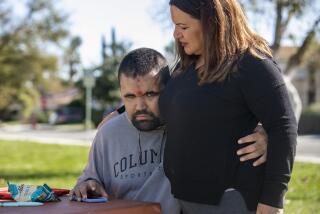The Unreal World: Boy bites girl on ABC’s ‘Private Practice’
- Share via
“Private Practice.”
10 p.m. Feb. 11 on ABC
Episode: “Love Bites”
The premise: Dr. Cooper Freedman (Paul Adelstein) and Dr. Pete Wilder (Tim Daly) treat 13-year-old Paige (Kaitlyn Dever) for a bite mark to her neck. She received it from her boyfriend, who claims he’s a 2,000-year-old vampire searching for his soul mate. But instead of eternal love, Paige has contracted hepatitis, as evidenced by fever and an enlarged liver. The alleged vampire apparently contracted the disease by biting other women.
Meanwhile, Dr. Addison Montgomery ( Kate Walsh) has performed an emergency C-section on a woman, Lauren, who was saved from drowning by the Coast Guard. The baby soon stabilizes, but Lauren develops a life-threatening heart arrhythmia (ventricular tachycardia), and her lungs collapse. The doctors discover she has a so-called hole in the heart (more technically known as a ventricular septal defect) that has “blown out” as a result of the accident and will now require an urgent repair. But having been abandoned by the baby’s father, Lauren refuses the surgery. Concerned that depression doubles her risks of dying during surgery — even should she agree to it — the doctors don’t try to push her into agreeing to the operation but do prescribe an antidepressant.
Lauren is still holding out hope that her husband will come back to her. It is only when Addison tells Lauren the truth (he told the doctors he wouldn’t be returning) that she is shocked into reality. Understanding that she is solely responsible for her child, she agrees to the surgery.
The medical questions: What are the risks of infection from human bites and what type of hepatitis is generally transmitted? What is the treatment? Is a patient with a ventricular septal defect more likely to experience heart failure and require surgery to repair the defect after an accident in the last stages of pregnancy, when the demand on the heart is greater? Is it reasonable to treat such a patient with an antidepressant in the hope that it will change her mind about agreeing to the surgery?
The reality: Human bites can transmit bacteria as well as viruses, including HIV. Hepatitis B has been transmitted by human bite, albeit quite rarely, says Dr. William Schaffner, chairman of the department of preventive medicine at Vanderbilt University School of Medicine. Research suggests that about 75% of patients with active hepatitis B are contagious, show evidence of the virus in their saliva and have the potential to infect. But as Schaffner points out, since Paige was presumably born and raised in the U.S., she likely would have been vaccinated against that type of the virus; that vaccine has been recommended for children in this country since 1991. Hepatitis C transmission by human bite is also possible, though also rare; no vaccine currently exists for that form of the disease.
Other possible infections that could be transmitted by human bites include bacterial infections of the skin, such as from Staphylococcus aureus and Eikenella corrodens. The immediate treatment for such bites, according to Dr. Billy Goldberg, assistant professor of emergency medicine at New York University’s Langone Medical Center, would be antibiotics, hepatitis B immune globulin to lessen the severity of a possible hepatitis infection, along with a thorough washing of the wound.
Ventricular septal defect is the most common form of congenital heart disease; 90% of the holes are small, and the majority close spontaneously in childhood. The few that are large cause potentially fatal problems in infancy — leading to severe heart failure (requiring surgical closure) or an increase in pressure in the lungs’ blood vessels (requiring lung transplant). Medium-sized defects are well tolerated but could cause problems at times of significant physical stress, requiring medical treatment, says Dr. Julien Hoffman, an expert on defects and a professor of pediatric cardiology at UC San Francisco. A patient with this size defect could develop an arrhythmia or have high pressure in the lung vessel, but “it is very unlikely that an adult would need urgent repair for a VSD,” regardless of injury or childbirth, Hoffman says.
The idea that depression automatically doubles the need for cardiac surgery is pure fiction, says Dr. Keith Ablow, a psychiatrist and author of “Living the Truth.” Thus, it would not make sense to delay needed surgery because a patient is depressed.
It’s reasonable, however, to prescribe an antidepressant in a patient suffering from loss of hope. In some cases, the patient might begin to feel the positive effects within a few days.
Ablow feels strongly that even a negative truth can lead to a positive “moment of epiphany.” It is when people are deprived of the facts — as was Lauren initially — that they tend to make the most irrational decisions, Ablow says.
Siegel is an associate professor at New York University’s School of Medicine and author of the e-book “Swine Flu: The New Pandemic.”
More to Read
The complete guide to home viewing
Get Screen Gab for everything about the TV shows and streaming movies everyone’s talking about.
You may occasionally receive promotional content from the Los Angeles Times.






